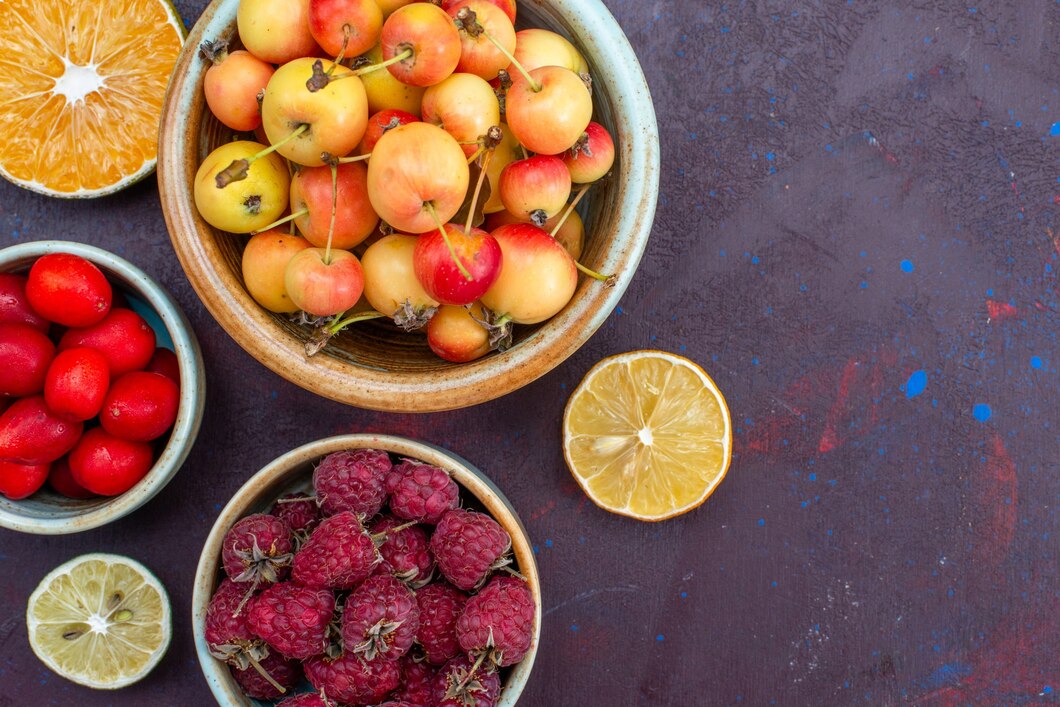Inflammation is a natural process your body uses to protect itself from infections and injuries. However, when inflammation becomes chronic, it can lead to serious health problems such as heart disease, diabetes, arthritis, depression, and Alzheimer’s. One of the most effective ways to combat chronic inflammation is through your diet. By choosing anti-inflammatory foods, you can reduce inflammation, lower your risk of disease, and improve your overall health.
Here are the top foods to include in your diet to fight inflammation.
1. Fruits Packed with Antioxidants
Fruits are some of the best anti-inflammatory foods, thanks to their high levels of antioxidants and polyphenols, which help neutralize harmful free radicals in the body.
- Berries: Strawberries, blueberries, and cherries are rich in anthocyanins, powerful compounds that reduce inflammation.
- Citrus fruits: Oranges, grapefruits, and lemons provide vitamin C, which supports immune health and reduces inflammation.
- Apples: Packed with fiber and polyphenols, apples promote gut health and combat inflammation.
Why They Work:
Fruits are loaded with natural compounds that combat oxidative stress, a key driver of inflammation.
2. Leafy Green Vegetables
Green vegetables are a staple of any anti-inflammatory diet.
- Spinach: A great source of vitamin E, which helps reduce inflammation.
- Kale: Rich in vitamin K and antioxidants that support bone and heart health.
- Collards: High in fiber and minerals that fight inflammation and promote overall health.
Why They Work:
Leafy greens are nutrient-dense and contain compounds that regulate inflammation at the cellular level.
3. Healthy Fats
Fats often get a bad reputation, but healthy fats can help reduce inflammation.
- Olive oil: Extra virgin olive oil is rich in monounsaturated fats and polyphenols that combat inflammation.
- Nuts: Almonds and walnuts contain omega-3 fatty acids and antioxidants that lower inflammation markers.
- Avocados: Packed with heart-healthy fats and compounds that reduce inflammation.
Why They Work:
Healthy fats help maintain balanced cholesterol levels and reduce the production of inflammatory substances.
4. Fatty Fish
Fatty fish are one of the most potent sources of anti-inflammatory omega-3 fatty acids.
- Salmon: High in EPA and DHA, two types of omega-3s that fight inflammation.
- Mackerel: A nutrient-dense fish that supports heart and brain health.
- Tuna and sardines: Affordable options that provide inflammation-fighting benefits.
Why They Work:
Omega-3s block inflammatory pathways, making fatty fish a cornerstone of anti-inflammatory eating.
5. Tomatoes
Tomatoes are a versatile and delicious way to fight inflammation.
- They are high in lycopene, a powerful antioxidant that reduces inflammation and supports heart health.
- Cooking tomatoes in olive oil enhances the absorption of lycopene.
Why They Work:
Tomatoes provide a double punch of anti-inflammatory benefits due to their antioxidants and high water content.
6. Whole Grains
Refined grains can trigger inflammation, but whole grains are a healthier choice.
- Oats: Rich in fiber and beta-glucans that support gut health and reduce inflammation.
- Quinoa: A protein-packed grain that offers anti-inflammatory benefits.
- Brown rice: A high-fiber alternative to white rice that helps regulate blood sugar and inflammation.
Why They Work:
Whole grains provide essential nutrients and fiber that support gut health and reduce inflammation.
7. Spices and Herbs
Certain spices and herbs are natural inflammation fighters.
- Turmeric: Contains curcumin, a compound with strong anti-inflammatory properties.
- Ginger: Helps reduce muscle soreness and inflammation.
- Garlic: Known for its immune-boosting and inflammation-reducing properties.
Why They Work:
Spices and herbs are concentrated sources of bioactive compounds that reduce inflammation.
8. Coffee and Tea
Both coffee and tea are rich in polyphenols, which have anti-inflammatory effects.
- Coffee: Contains compounds that reduce inflammation and support brain health.
- Green tea: Packed with catechins, a type of antioxidant that fights inflammation.
Why They Work:
These beverages provide an easy way to incorporate anti-inflammatory compounds into your daily routine.
The foods you choose can significantly influence your body’s inflammatory response. By focusing on anti-inflammatory options such as fruits, vegetables, healthy fats, fatty fish, whole grains, and spices, you can reduce chronic inflammation and protect yourself from many diseases.
Remember, a consistent and balanced approach to anti-inflammatory eating can transform your health and improve your quality of life. Instead of reaching for unhealthy snacks, stock your kitchen with these inflammation-fighting foods and enjoy the benefits of a healthier body and mind.








